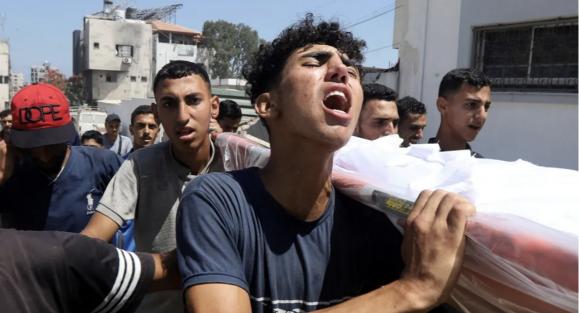Mediators push for Gaza ceasefire as casualties mount and talks stall

The death toll in Gaza continues to climb. More than 860 Palestinians have been killed since the Israel-Iran conflict began, and overall casualties since the wider Gaza war erupted last October have reached at least 56,157, according to Gaza’s health ministry.
Efforts to broker a new ceasefire in Gaza have intensified, according to a senior Hamas official, but hopes for a breakthrough remain dim as negotiations with Israel appear to be at a standstill. The official told the BBC that mediators are involved in "intensive contacts aimed at reaching a ceasefire agreement," but also noted that "no new proposal" had been received.
The comments came shortly after US President Donald Trump said he believed “great progress” was being made in the wake of the 12-day conflict between Israel and Iran. Speaking to reporters in Brussels, Trump said, “I think great progress is being made on Gaza, I think because of this attack that we made.” He was referring to recent US airstrikes on Iranian nuclear facilities carried out during the conflict. “I think we're going to have some very good news. I was talking to Steve Witkoff... [and] he did tell me that Gaza's very close.”
Despite Trump’s optimism, Israeli officials have offered a more sobering assessment. One official told the Haaretz newspaper that negotiations remain deadlocked due to deep disagreements, and there has been no recent movement toward an agreement.
US, Qatari, and Egyptian efforts to broker a truce collapsed at the end of May, when Hamas rejected a US-backed proposal calling for a 60-day ceasefire and the phased release of hostages. Hamas reportedly demanded amendments that US envoy Steve Witkoff described as "totally unacceptable."
Since resuming its offensive on March 18, Israel has aimed to increase pressure on Hamas to release around 50 remaining hostages, at least 20 of whom are believed to be alive. The renewed campaign followed the breakdown of a previous two-month truce and coincided with a full blockade on aid deliveries to Gaza. That blockade was partially eased 11 weeks later after intense pressure from US allies and global warnings of famine affecting hundreds of thousands.
To address the humanitarian crisis, the US and Israel supported the creation of the Gaza Humanitarian Foundation (GHF), which began operating on May 26. The GHF, staffed by US private security contractors, has distributed over 44 million meals so far, including 2.4 million at three sites on Wednesday alone. The new mechanism bypasses the UN, which Israel accuses of failing to prevent Hamas from diverting aid. Hamas denies those claims.
However, major aid groups and the UN have refused to work with the GHF, accusing it of aligning with Israeli objectives and ignoring humanitarian norms. They have also raised alarm over repeated reports of civilians being killed near GHF’s distribution sites, which are located in areas controlled by Israeli forces.
Since GHF began operations, Gaza’s health ministry reports that at least 549 people have been killed and 4,000 injured while trying to collect aid. On Wednesday, the Hamas-run Civil Defence agency said Israeli troops opened fire at aid-seekers, killing six in central Gaza and three more in Rafah. The Israeli military responded by saying it was “not aware of any incidents with casualties in those areas,” and the GHF called the reports “false.”
In Gaza City, funerals were held for dozens reportedly killed while waiting for food. “I say and repeat a million times,” a man named Abu Mohammed told Reuters. “These aid points are not aid points, these are death points.”
James Elder of Unicef, who recently visited Gaza, expressed concern about the situation: “So long as a population is denied food, people are being offered this lethal choice and, unfortunately, because it's in a combat zone, it cannot improve.”
Wednesday’s violence was not limited to aid sites. The Civil Defence agency reported an Israeli airstrike on a home in Nuseirat refugee camp killed six people, including a child, and that five more died in a separate strike in Deir al-Balah.
The death toll in Gaza continues to climb. More than 860 Palestinians have been killed since the Israel-Iran conflict began, and overall casualties since the wider Gaza war erupted last October have reached at least 56,157, according to Gaza’s health ministry.
On the Israeli side, the military said seven soldiers were killed Tuesday in a Hamas bombing in Khan Younis, the deadliest day for Israeli troops since the collapse of the previous ceasefire. According to military spokesperson Brigadier-General Effie Defrin, an explosive device hit an armored vehicle, setting it on fire. Several rescue attempts failed.
The incident reignited debate within Israel’s leadership. Moshe Gafni, head of an ultra-Orthodox party in the governing coalition, questioned the war’s purpose. “I don't understand what we're fighting for and for what purpose... when soldiers are being killed all the time?” he said in parliament.
Gaza residents are divided on what the recent developments mean. Some believe Iran’s setback could push Hamas toward compromise. Others fear Israel will now concentrate more forcefully on Gaza. “The [Israeli] bombing intensified, the damage increased, and the incursion expanded in certain areas… We only felt the destruction,” said Nader Ramadan in Khan Younis.
Adel Abu Reda said the biggest struggle remains access to food. “What are we supposed to do?” he asked. “We feel the shooting and the killing all the time.”
As both sides remain entrenched and civilians continue to suffer, the possibility of a ceasefire feels both urgent and uncertain.
